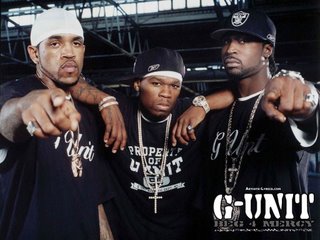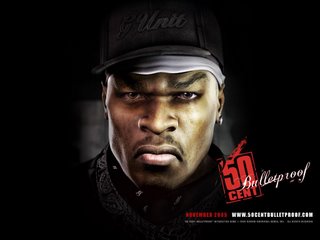Tuesday, January 09, 2007
The Successes and Struggles of the Modern Hip-Hop
Mogul. Part 2 of 2.
To view Part 1 please click here.
A Limelight Exclusive
By Byron Lee
Mogul. Part 2 of 2.
To view Part 1 please click here.
A Limelight Exclusive
By Byron Lee
Last month, we profiled two of rap's major power players: Nelly and Jay-Z. This month, we turn the spotlight towards the industry's two most successful and polarizing figures: Sean "Diddy" Combs and Curtis "50 Cent" Jackson.

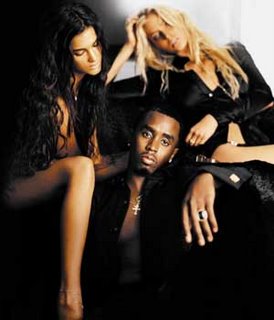
FLAUNTING IT: Diddy styles and profiles in the sun.
No one has taken Russell Simmons's blueprint of brand diversification to more successful heights than Sean Combs, who was recently listed by Fortune Magazine as the most wealthy person in rap. He embarked on his career by dropping out of Howard University and working as an intern at Uptown Records under then President Andre Harrell. The polite, professional Combs worked hard and was eventually, at the age of 19, named Division Director, which put him in a position to develop acts. He would quickly make a name for himself by exposing the public to talented R&B acts with a hip-hop edge, such as Jodeci (which contained K-Ci and JoJo Hailey, who would eventually become a superstar duo on their own) and Mary J. Blige.
The success soon went to Combs's head, and his arrogance alienated his co-workers to the extent that he was fired from Uptown. After sulking in his apartment for a weekend, he plugged his phone back in and found a message from Arista Records. Industry legend Clive Davis was impressed by Combs's work and wanted Combs to operate a new urban music imprint being started through Arista. Combs agreed and christened the imprint "Bad Boy."

THE PERFECT PAIR: Many felt that Combs and Bad Boy flagship artist the Notorious B.I.G. complemented each other perfectly, with the latter being the "Ghetto" to the former's "Fabulous."

LIVE ON STAGE: Regardless of their feelings on his music, people have to admit that Combs knows how to put on a show.
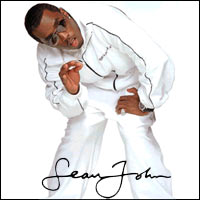
IN STYLE: Comb's "Sean John" clothing line became an instant success, becoming ubiquitous in urban and mainstream fashion outlets.

POWER COUPLE: Sean Combs and Jennifer Lopez provided fodder for urban, fashion, and tabloid journals during their courtship.
While his clothing line got off the ground, his romantic life became more public. Combs struck up a rapport with pop culture hyphenate Jennifer Lopez while the two worked together on the video for Diddy's single "Been Around The World." Soon, the two were inseparable, making headlines with their public appearances at award shows, particularly Jennifer Lopez's iconic green dress at the 2000 Grammys. (It is also rumored that Combs gave Lopez the boost she needed in order to take the step towards a recording career.)
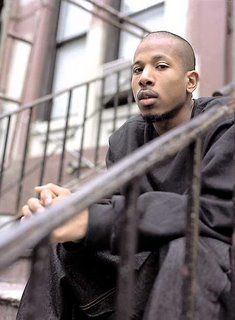 The relationship encountered rocky waters in December of 1999, when a shooting occurred at a nightclub where Diddy, Lopez and then-Bad Boy artist Jamal "Shyne" Barrow were celebrating. The resulting negative publicity (both Combs and Barrow faced charges, while Lopez was not charged) created a fissure that never truly closed. The couple announced their break up on Valentine's Day 2001.
The relationship encountered rocky waters in December of 1999, when a shooting occurred at a nightclub where Diddy, Lopez and then-Bad Boy artist Jamal "Shyne" Barrow were celebrating. The resulting negative publicity (both Combs and Barrow faced charges, while Lopez was not charged) created a fissure that never truly closed. The couple announced their break up on Valentine's Day 2001.

MAKEOVER: Perhaps as an attempt to improve his
post-trial image, Diddy started appearing in public
dressed in the suits from his Sean John line.

ON THEIR OWN: Feeling neglected by Combs, acclaimed R&B quartet 112 eventually started their own independent record label.
The public's perception of Combs is rooted in a concern over how he treats his artists as a whole. Carl Thomas and Black Rob, who were, at one point, two of the most popular artists on the Bad Boy label, went 4 years and 6 years, respectively, without releasing albums. However, when Combs released one of his own albums, the LP seemed to receive all of the attention of Bad Boy's promotions department. 112, another staple of the label's glory years, were so disenchanted with how they were been handled that they tried to leave the label. (Eventually, an agreement was made to split professional interest in the group equally between Bad Boy and Island Def Jam. 112 is now presiding over their own independent label.) Finally, veteran group New Edition, who released their 2004 album "One Love" through Bad Boy, severed ties with the label over Combs's refusal to release a track produced by hitmakers Jimmy Jam and Terry Lewis.

"RAISIN" HIS PROFILE: Combs earned modest reviews for his performance in the revival of "Raisin in the Sun," but simultaneously brought a new audience to the theater.

DOIN' TOO MUCH?: Many people thought that Diddy's "Vote or Die" campaign was awkward and ineffective.
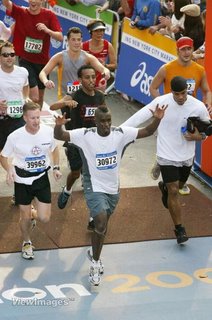
BEST FOOT FORWARD: Diddy finishes the New York
Marathon.
Diddy would soon have an incentive to return to his first love. Bad Boy received a new lease on life last year when Warner Music Group purchased a large minority stake in the label and bought out the remainder of the agreement between Bad Boy and Universal Music Group. New artists such as Cassie (whose "Me and You" has dominated R&B charts), Danity Kane (the multicultural singing group comprised of winners of Diddy's second installment of MTV's "Making The Band") and Atlanta rapper Yung Joc have put the label back on top of the charts. Soon the head honcho will be back in stores when Diddy's new album "Press Play" arrives in mid-October. It seems that, regardless of what people may think of him, Sean Combs cannot be stopped.

2 ON THE WAY: Diddy and girlfriend Kim Porter, with
whom he has one child. The couple recently announced
that they were having twins.
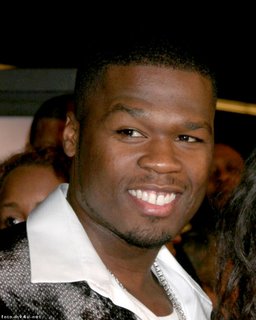
THE NEW SCARFACE?: 50 Cent has often drawn lyrical parallels between his rise to power and that of Tony Montana, Al Pacino's character from the cult film "Scarface."
Another powerful force in the rap industry in recent years has been Curtis "50 Cent" Jackson. Jackson was born in Jamaica, Queens, N.Y. to a drug-dealing single mother. (After his mother was gunned down, he went to live with his grandmother). His mother's friends introduced him to drug running, and a series of plea bargains on drug charges would lead him to stints in both rehab and a military style boot camp. He eventually poured his bravado and his hunger for a better life into rhyme. DJ Jam Master Jay, of the pivotal group Run-DMC, took 50 under his wing and signed him to Columbia Records, where 50 recorded the satirical song "How To Rob," in which the rapper deliberated as to which successful rappers he should rob and how he should go about it. Suffice it to say that many of the real-life rappers mentioned in the song did not find the track to be all that humorous, and the struggling rapper found his name on the lips of many rap heavyweights (Jay-Z famously mentioned 50 on "It's Hot (Some Like It Hot)" from Jay's 4th album "Vol. 3".)
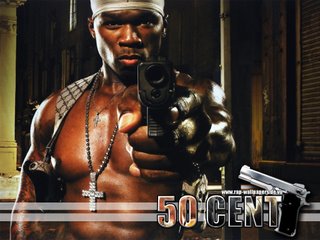
POINT BLANK: This photo, from the album jacket of 50's Shady/Aftermath debut, "Get Rich Or Die Tryin'," made his image perfectly clear.
In 2000, an event would forever change his life. He was shot nine times outside of his grandmother's house by a rival (the rival was murdered several weeks later). Jackson miraculously drove himself to the hospital. While convalescing, he was dropped by his record label.
Struggling to get back to recording, he was aided by producer Sha Money XL, who allowed 50 recording space to make songs for mixtapes (In the rap world, mixtapes are compilations of new songs, or of new freestyles performed over the beats of popular songs, that are released to the streets in order to create, or continue, buzz on a certain artist.). It was during this time that 50 took a major step in building his empire: he recruited rappers who were more skillful than he was, chief among them lyrical monster Lloyd Banks, in order to strengthen his crew.
Learning from his experience in his previous profession, ("Consistency is the key" he said in a 2003 interview with Rolling Stone.) his crew, G-Unit, flooded New York with high quality mixtapes that kept the streets talking. The recordings were bolstered by 50's new gruff, mumbled delivery, a result of a shot he took to the face during the attempt on his life. The buzz became so deafening that it drew the attention of Shady/Aftermath Records, the label run by Dr. Dre and Eminem. The duo flew 50 out to Los Angeles and, impressed with his demeanor, signed him to a recording deal worth 1 million dollars, and gave him his own imprint, G-Unit Records, in order for him to make money off of the artists he brought to the label.
Jackson immediately started securing trademarks for G-Unit, while industry veteran Chris Lighty, who signed on as 50's manager, started looking for endorsement deals. The rapper now has his own shoe deal (through Reebok), his own video game (50 Cent: Bulletproof), his own clothing line (G-Unit), and his own Vitamin Water (Vitamin 50). 50's 2003 Shady/Aftermath debut, "Get Rich Or Die Tryin," sold 6 million copies, bolstered by the irresistible pop anthem "In Da Club," and the public disclosure of what 50 referred to as "street beef" with then-chart reigning pop rapper Ja Rule. Releases from G-Unit members Lloyd Banks and Young Buck appeared shortly thereafter. Furthermore, in what was an inevitable move, 50 appeared in a movie loosely based on his life, "Get Rich or Die Tryin'," last year. While the film did not fulfill expectations at the box office (it was noticeably released in far fewer theaters than Eminem's 2002 flick "8 Mile," the success of which "Get Rich" was clearly patterned to mimic), 50 seems undaunted.
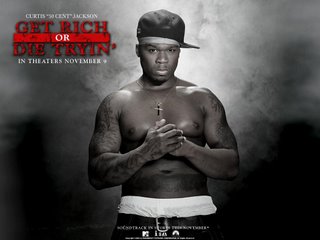
A POOR SHOWING: Plagued by poor distribution, 50 Cent's film debut, "Get Rich or Die Tryin'" failed to find box office fortune.
Perhaps the performance of the film is a sign of declined public interest in Jackson. There seems to be a feeling amongst many that the rapper is overexposed, rimarily due to the products he released in 2005 (his sophomore LP, "The Massacre," the aforementioned film, the soundtrack to said film, and an autobiography, "From Pieces To Weight".)
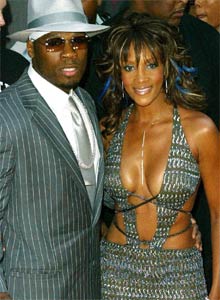
SPLITSVILLE: 50's treatment of Vivica A. Fox after escorting her to the 2003 MTV Video Music Awards made him seem horribly immature.
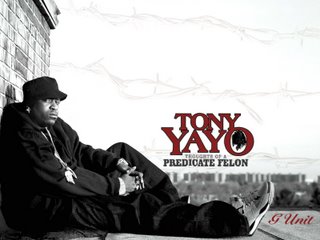
THE BEGINNING OF THE END: Music lovers seem to think that the poor commercial performance of G-Unit albums, such as Tony Yayo's "Thoughts of a Predicate Felon", signal the end of G-Unit's reign on top of the charts.
It seems as if one could set their watch according to his latest publicity stunt. Finally, even though he has a talented stable of performers on his label, few of them could be marketed as superstars. The infectious energy of Tony Yayo couldn't power "Thoughts of a Predicate Felon" to commercial success, and even rap stalwarts Mobb Deep failed to move units with the release of the album "Blood Money."


THE ONE THAT GOT AWAY: Many feel that The Game's dismissal from G-Unit was fueled by 50 Cent's fears that the Game might overshadow him.
Regardless of how many setbacks they face, today's Hip-Hop Moguls will find a way to be triumphant.

ARTISTIC STATEMENT: 50 Cent's back tattoo acknowledges the New York Southside Jamaica Queens area in which he grew up.
